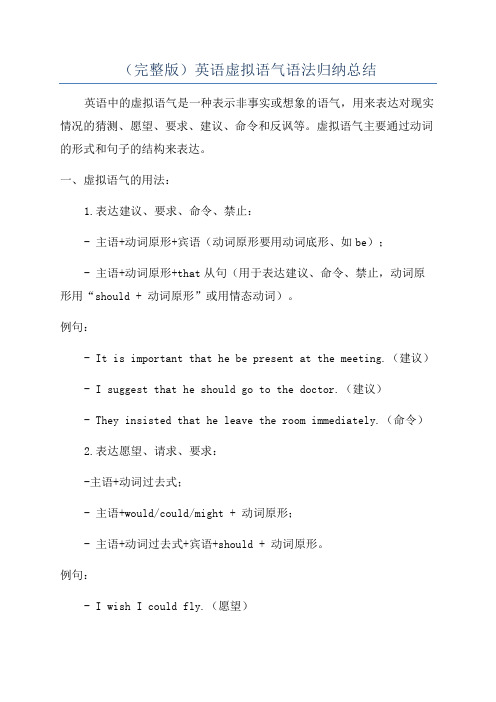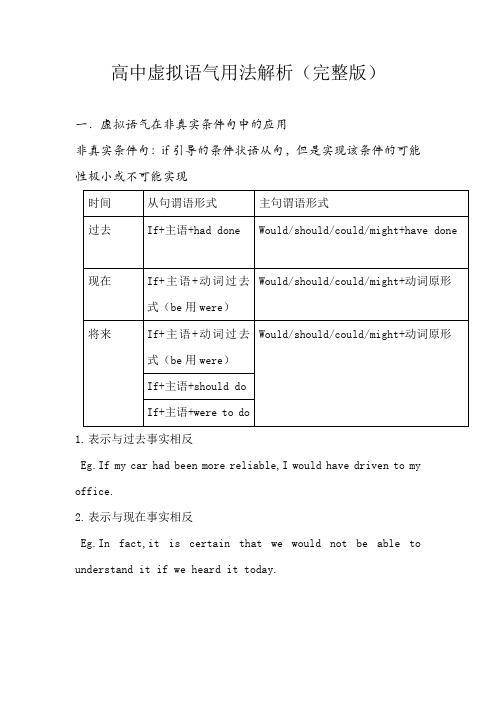虚拟语气在宾语从句和if only等的使用
(完整版)英语虚拟语气语法归纳总结

(完整版)英语虚拟语气语法归纳总结英语中的虚拟语气是一种表示非事实或想象的语气,用来表达对现实情况的猜测、愿望、要求、建议、命令和反讽等。
虚拟语气主要通过动词的形式和句子的结构来表达。
一、虚拟语气的用法:1.表达建议、要求、命令、禁止:- 主语+动词原形+宾语(动词原形要用动词底形、如be);- 主语+动词原形+that从句(用于表达建议、命令、禁止,动词原形用“should + 动词原形”或用情态动词)。
例句:- It is important that he be present at the meeting.(建议)- I suggest that he should go to the doctor.(建议)- They insisted that he leave the room immediately.(命令)2.表达愿望、请求、要求:-主语+动词过去式;- 主语+would/could/might + 动词原形;- 主语+动词过去式+宾语+should + 动词原形。
例句:- I wish I could fly.(愿望)- I would appreciate it if you could help me.(请求)3.表示虚拟条件:- If条件从句中的谓语动词用过去完成时,主句用would/should/might/could + have + 过去分词;- If条件从句中的谓语动词用过去时,主句用would/should/could + 动词原形。
例句:- If I had known his phone number, I would have called him.(虚拟条件)- If you had listened to me, we could have finished the project earlier.(虚拟条件)4.表达建议、要求、祝愿:- If only内部称述 + 主语 + 过去式。
虚拟语气在宾语从句中的用法

虚拟语气在宾语从句中的用法虚拟语气在宾语从句中的用法主要是表示一种与事实相反或不可能实现的假设、愿望、建议、命令等。
常用的虚拟语气形式有虚拟条件状语从句的"if"引导的虚拟语气、愿望句型的虚拟语气以及建议、命令等句型的虚拟语气。
1.虚拟条件状语从句的"if"引导的虚拟语气:在宾语从句中,如果条件句表达的是不可能实现或与事实相反的情况,那么主句的谓语动词就可以采用虚拟语气来表达。
例如:- I wish he were here.(我希望他在这里。
)其中,"were"是虚拟语气的过去式形式,用于表示与现实相反的情况,即实际上他不在这里。
2.愿望句型的虚拟语气:在宾语从句中,如果表达的是一种渴望或愿望,而该愿望实际上是不太可能实现的,那么常常使用虚拟语气来表达。
例如:- I would rather you came tomorrow.(我希望你明天来。
)其中,"came"是虚拟语气的一种形式,用于表示与现实相反的情况,即实际上他未来。
3.建议、命令等句型的虚拟语气:在宾语从句中,如果主句是一个建议、命令等,而宾语从句所表示的内容是不可能实现或与事实相反的情况,那么主句的谓语动词也可以采用虚拟语气来表达。
例如:- The teacher asked that he not be late for class.(老师要求他不要迟到。
)其中,"be"是虚拟语气的一种形式,用于表示与现实相反的情况,即实际上他经常迟到。
虚拟语气在宾语从句中的使用可以使句子更丰富多样,并能够准确表达说话人的想法、意愿和假设。
但需要注意的是,虚拟语气用法的正确性与自然性需要根据具体情况和语境来判断。
完整版)虚拟语气用法归纳

完整版)虚拟语气用法归纳虚拟语气是动词的一种形式,表示说话人对某一行为或事情的看法和态度。
语气的种类包括陈述语气、祈使语气和虚拟语气。
陈述语气用于陈述句、疑问句和某些感叹句,表示动作或状态是现实的、确定的或符合事实的。
例如:“XXX.”,“XXX?”和“How good a teacher she is!”祈使语气表示说话人对对方的请求或命令。
例如:“Never be XXX!”和“Don’t et to turn off the light.”虚拟语气表示动作或状态不是客观存在的事实,而是说话人的主观愿望、假设或推测等。
例如:“If I were a bird。
I could fly in the air.”,“I wish I could pass the XXX.”和“May you succeed!”在简单句中,虚拟语气常用于情态动词的过去式用于现在时态时,表示说话人的谦虚、客气、有礼貌、或委婉的语气,常用于日常会话中。
例如:“XXX to show me the way to the post office?”和“It would be better for you not to stay up too late.”虚拟语气还可以用于表达祝愿,常用“may+动词原形”表示。
例如:“May good luck be yours!”,“May you be happy!”和“May you do even better!”。
还可以用于表达愿望和建议。
例如:“If only XXX.”和“XXX.”如果我现在有时间,我会和他们一起去。
(陈述语气)如果我现在是你,我就会和他们一起去。
(虚拟语气)与过去事实相反:若与过去事实相反,条件从句的谓语用过去完成时(be动词用had been),主句谓语用“should (would。
could。
might)+have+过去分词”。
如:如果我昨天有时间,我就和他们一起去了。
英语虚拟语气在从句中的用法及其表达方式

英语虚拟语气在从句中的用法及其表达方式摘要虚拟语气是一种特殊的动词形式,用来表示说话人所说的话不是事实,而是一种假设、愿望、怀疑、建议、猜测、可能或纯粹的空想等。
虚拟语气在英语中有多种表达方式,可以用于不同类型的从句中,如条件从句、名词性从句、状语从句、定语从句等。
本文将介绍虚拟语气在从句中的基本用法和常见句型,并给出相应的例句。
一、虚拟语气在条件从句中的用法条件从句是由连词if或其他连词引导的表示条件或假设的从句。
条件从句可以分为四种类型,分别对应不同的虚拟语气形式:类型条件从句主句含义例句真实条件if + 一般现在时一般将来时/情态动词+动词原形表示可能发生或实现的情况If it rains tomorrow, we willstay at home.与现在事实相反if + 一般过去时/过去进行时would/could/might/should+动词原形表示与现在事实相反或不可能实现的假设If I were you, I would studyharder.与过去事实相反if + 过去完成时/过去完成进行时would/could/might/should+have+过去分词表示与过去事实相反或无法改变的假设If he had studied harder, hewould have passed theexam.与将来事实相反if + should/were to+动词原形/一般过去时would/could/might/should+动词原形表示对将来不太可能发生或实现的假设If I should win the lottery, Iwould travel around theworld.二、虚拟语气在名词性从句中的用法名词性从句是指在句子中充当名词功能的从句,包括主语从句、宾语从句、表语从句和同位语从句。
名词性从句中可以使用虚拟语气来表示说话人的愿望、建议、命令、要求等。
1. 虚拟语气在宾语从句中的用法宾语从句是指在复合句中作主要成分动词或介词的宾语的从句。
虚拟语气的全面讲解

当条件状语 从句行为和主句表示的行为所发生的时间不一致时, 动词的形式要根据它所表示的时间来调整。
If you had worked hard, you would be very tired. If they had left home in early morning, they would arrive in half an hour. If I were you ,I wouldn‘t have missed the film last night. If you had spoken to him last time you saw him, you would know what to do now.
III. 在不同时间下,虚拟语气的三种形式,公式。 I.与现在事实相反 Were might If+主语+ 过去式动词 would 过去式助动词 , 主语+ could + V Should II.与过去事实相反 might would + have + 过去分词 If +主语+had +过去分词, 主语 + could Should
练习
1) If you ___ the doctor’s advice, you would have recognized already. A. followed B would follow C follow D had followed 2) If my lawyer ____ here last Saturday, he ___ me from going. A had been , would have prevented B had been, would prevent C were, would prevent D were, would have prevented 3) I ___ if she ____ me. A would have overslept,didn't call B would have overslept, hadn’t called C overslept, hadn't called D would overslept, didn't call 4) ---- If he ___, he___that food. ----Luckily he was sent to the hospital immediately. A was warned, would not take B had been warned, would not have taken C would be warned, had not taken D would have been warned, had not taken 5) She _____ to the party if she _____ invited. A would have gone, had been B would go , was C would have gone, was D has gone
虚拟语气用法总结

虚拟语气用法总结虚拟语气是说话者用来表示假设,或难以实现的情况,而非客观存在的事实。
学习虚拟语气,我们需要注意以下几个要点:一、虚拟语气在带有条件状语从句的复合句中的构成和用法。
根据不同的时间,主、从句中动词形式如下表:If we left now, we would arrive in good time. 如果我们现在就走的话,我们就会及时到达。
They would have come to your party if they had had time. 如果他们有时间就会参加你的聚会。
If you lived there for a while, you’d change your mind about the place. 如果你在那儿住上一段时间,你就会改变对那地方的看法。
这里我们需要注意以下三点:1. 错综时间条件句有时条件状语从句中的动作和主句中的动作发生的时间不一致,这时动词的形式要根据它所表示的时间加以调整。
如:If you had listened to the doctor, you would be all right now. 如果你当初听了医生的话,身体现在就好了。
2. 虚拟条件句的倒装形式如果虚拟条件从句中有were, had或should时,可以把if省略,而把这几个词放到主语之前,构成倒装句。
如:Were I you, I wouldn’t go there alone. 如果我是你,我不会一个人去那儿的。
Had he worked harder, he would have got through the exam. 如果他学习再努力点的话,他就会通过考试。
Should you be fired, your health care and other benefits will not be immediately cut off. 如果你被解雇,你的医疗保险和其他权益并不会立即中断。
高中虚拟语气用法解析

高中虚拟语气用法解析(完整版)一.虚拟语气在非真实条件句中的应用非真实条件句:if引导的条件状语从句,但是实现该条件的可能性极小或不可能实现1.表示与过去事实相反Eg.If my car had been more reliable,I would have driven to my office.2.表示与现在事实相反Eg.In fact,it is certain that we would not be able to understand it if we heard it today.3.表示与将来事实相反Eg.If you succeed,everything would be all right.Grace doesn't want to move to New York because she thinks if she were to live there,she wouldn't be able to see her parents.4.注意事项(1)W as不可以替代were,虚拟语气中,从句中be动词只有were(2)错综时间条件句:条件句的行为和主句行为发生的时间不一致,动词的形式按照主句和从句各自的时间调整。
Eg.If he had listened to me, he would not be in such trouble now. If it had not been raining too much, the crops would be growing much better.(3)虚拟条件句中的谓语动词含有were/ should /had 时,if可省略,而将were/ should /had 置于主语前面Eg.What would have happened had Bob walked farther as far as the river bank?Should he agree to go there, we should send him there. Were it Sunday tomorrow, we should go to the great wall.两个固定搭配:①Were it not for 要不是...就②Had it not been for 要不是...就If it were not for (Were it not for)the bad weather now, we would go to the park to fly kites.If it had not been for(Had it not been for) the bad weather yesterday, we would have gone to the park to fly kites. (4)含蓄虚拟条件句:有时假设的情况不是以if条件句来表示。
高中英语虚拟语气用法详解

⾼中英语虚拟语⽓⽤法详解虚拟语⽓语⽓(mood)也是动词的⼀种形式变化。
这和中⽂中的语⽓是不⼀样的。
它表⽰说话者对所指的动词或状态所持的态度,⽽且,在谓语动词上有所体现,⽽中⽂没有体现。
语⽓可分为三种:陈述语⽓、祈使语⽓和虚拟语⽓。
虚拟语⽓(the Subjunctive Mood)表⽰说的话不是事实,或者是不可能发⽣的情况,⽽是⼀种愿望、建议或与事实相反的假设等。
⼀、虚拟条件句1.主句和从句都与现在事实相反时,从句⽤⼀般过去时,be的形式要⽤were,主句⽤would/could/ should/might+不定式⼀般式。
If I were you, I should not go with him.2.主句和从句都与过去事实相反时,从句⽤过去完成时,主句⽤would/should/could/might+不定式完成式。
If I had tried hard last term, I would have succeeded.3.当主句和从句都与将来事实相反,或指不⼤可能发⽣的事的时候,从句和与现在事实相反的从句时态相同,或⽤should/were to+不定式⼀般式,主句和与现在事实相反的主句相同。
If it rained/were to rain/should rain tomorrow, the match would be put off.4.在使⽤虚拟条件句时,由于语⾔环境的千差万别,各种时间关系混合使⽤是很常见的。
如果逻辑上讲得通,主句和从句的动词时态可进⾏各种各样的搭配。
If it hadn't rained those days, (从句与过去事实相反)1 work would be finished next week. (主句与将来事实相反)2.here wouldn't be any water in the river now. (主句与现在事实相反)⼀、语⽓及其种类1.语⽓(mood)语⽓是⼀种动词形式,表⽰讲话⼈对某⼀⾏为或事情的看法和态度。
- 1、下载文档前请自行甄别文档内容的完整性,平台不提供额外的编辑、内容补充、找答案等附加服务。
- 2、"仅部分预览"的文档,不可在线预览部分如存在完整性等问题,可反馈申请退款(可完整预览的文档不适用该条件!)。
- 3、如文档侵犯您的权益,请联系客服反馈,我们会尽快为您处理(人工客服工作时间:9:00-18:30)。
If only (I wish) it would rain tomorrow.
现在: 过去时 did/were 2) would rather 过去: 过去完成时 had done that 未来:过去时 did/were
I would rather you paid me now. I would rather you had gone, too.
注意: 如果表示的事情可能会发生, 那么方 式状语从句中的谓语动词可用陈述语气。
It looks as if we’ll be late.
He behaves as if he owned the house.
She talks about Rome as though she had been there herself.
I wish/wished I_________ hadn’t eatenso much watermelon.
The party was terrible, I wish
I ____________ to it. hadn’t gone
I wish it would rain tomorrow.
Attention2: 条件状语的倒装:
如果条件状语中有were, had, should时, 可以倒 装成:Were / Should / Had +主+其他 If I were you, I would try it again. Were I you, I would try it again. If he had been there yesterday, he would have seen the film. Had he been there yesterday, he would have seen the film. If it should snow tomorrow, we wouldn’t go out. Should it snow tomorrow, we wouldn’t go out.
要是明天下雨就好了。(说话人预料明天不会下雨)
If only (I wish) it would rain tomorrow.
I wish I were ____as tall as you.
I wish I were a bird.
were my birthday. I wish every day _____
二. 虚拟语气在wish后的宾语从句中的用法:
宾语从句
现在
wish后的从句的谓语形式
过去时(be用were)
过去
未来
过去完成时 (had done)
would/could/might+动词原形
二、虚拟语气在宾语从句中的用法
1)wish + that How I wish If only (=I wish)
did/were 现在 had done 过去 would / might /would do 将来
我要是记得地址就好了。(真可惜我忘了)
I wish I remembered the address. 要是他没有离开这里就好了。(他已离开) How I wish he had not left.
要是明天下雨就好了。(说话人预料明天不会下雨)
二、虚拟语气在宾语从句中的用法
1)wish + that How I wish If only (=I wish)
did/were 现在 had done 过去 would / might /would do 将来
பைடு நூலகம்
我要是记得地址就好了。(真可惜我忘了)
I wish I remembered the address. 要是他没有离开这里就好了。(他已离开) How I wish he had not left.
Don’t come. I would rather you came tomorrow.
三、as if /though 引导的状语从句
现在: did /were 过去: had done
将来 : would+动词原形 She loves the baby as if it were her own son. He speaks as if he had been to the United States.
